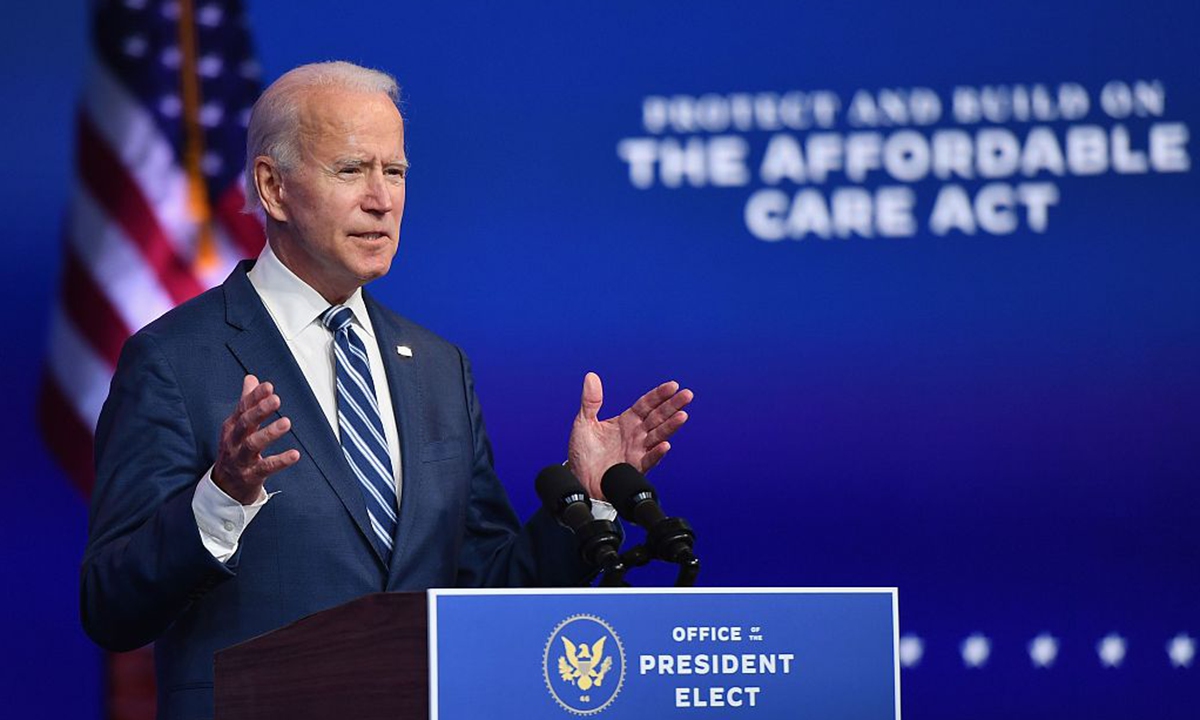Experts look forward to Biden administration addressing issues that separate China, US
Source: Global Times Published: 2020/11/14 11:53:41

Joe Biden. Photo: VCG
Editor Note:
China-US relations have faced unprecedented challenges now. The direction of the bilateral relationship has not only affected the development of the two countries, but also the future of the world. Where will China-US relations head after the new US administration takes office? How will Biden's China policies differ from Trump's? The Global Times collected opinions from several speakers at China Development Forum on Friday.
William Cohen, former US defense secretary and Chairman of the Cohen Group
I think it's very clear that there is going to be a very different tone that the Biden administration in dealing with China and with other countries. There will be a different tone, one of civility, one of a statesmanship, one of responsibility and personal relationship building. So I think there'll be a very different tone from what you've seen for the past four years.
But that doesn't mean there's going to be much of a change in substance. The issues which we've been foundering on for the past four or even longer years really are centered around strategic distrust. We still have a strategic distrust between us. China doesn't trust the US and the US doesn't trust China in terms of how we've been dealing with issues like the military and human rights. Those are all issues on which we are will continue to disagree on.
So I am looking forward to a Biden administration who will try to address these issues that currently separate us. There are so many issues that we can cooperate on, on the environment issues, pandemic issues, dealing with nuclear weapons and countering terrorism. Those are the issues where we certainly can come to an agreement.
I'm sure that the Biden administration will continue to talk about human rights and put that on its agenda. So those are issues which will be contentious. They could start a friction but this is something that is really indigenous, I might say.
Zhang Baijia, former deputy director of the Party History Research Center of the CPC Central Committee
The US now regards China as a strategic competitor. This is the fundamental reason why bilateral relations cannot return to what they were in the past. But I want to emphasize that the goals of China and the US are different. The US wants to maintain its global leadership, while China hopes to safeguard its right to development.
China and the US will witness a comparatively plain relationship in the next two years to come. After the leadership change in the US, the two countries may mend fences in some areas so as to avoid bilateral relations spiraling out of control. Meanwhile, the two will carefully consider the gains and losses of their past policies and mull over how to engage with each other.
Judging from the current situation, on top of the agenda of both countries are many domestic issues. For China, 2020 is critical in the decisive battle to comprehensively building a moderately prosperous society and is the year that the 14th Five-Year Plan was mapped. And next year China will celebrate the 100th anniversary of the founding of the Communist Party of China. For the US, there exists a demand to bridge the domestic divide, and to contain the pandemic. The Democrats also need to strive for an advantageous position in the 2022 middle-term elections. Therefore, these will lead to a buffer period in the China-US relations.
It's expected that the Biden administration will act differently from the Trump administration. It will abandon Trump's "America First" unilateralism, and make changes in many aspects. But though there may be some adjustments, the basic policy that takes China as a strategic competitor will not change. For China, the policy change of the US will be both a challenge and an opportunity.
Craig B. Allen, president of the US-China Business Council
Since the US-China trade conflict began approximately three and half years ago, uncertainty in relations has really become a top challenge for US businesses operating in China, and for Chinese companies operating in the US. Volatility in the politic policy and regulatory environment, and the threat of countermeasures create unprecedented challenges to businesses planning and supply chain stability.
We have said for many years that the business community takes a long term view of the relationship, so that means that we look beyond current challenges, our companies value our employees and customers in China.
The business community hopes for a stable consistent policy in the 70 days before the new administration is sworn in. There are many challenges between now and the inauguration day, and not all are on the US side. For example, it looks unlikely that China will meet its ambitious targets set out for 2020 phase one [of their trade agreement], which may threaten the resilience of the agreement. In addition, just yesterday we saw another executive order that is intended to restrict American investment in Chinese companies that may have a relationship with the PLA. There may be increased tensions in strategic issues between the two countries. We encourage both sides to maintain calm and stability and avoid undermining business confidence in this transition period as we all prepare for a new administration to take office.
There are many new key positions that President-elect Biden must fill. The policy approach regarding China is still under development. We need to be patient and give the new team a bit of time. However, the business community is already advocating a policy that quickly addresses our commercial concerns while building a more sustainable, long-term relation. One of those major issues is trade. Phase one (trade deal) remains an important commitment embraced by both countries. Both sides should meet their commitments to ensure that tariffs are progressively removed, trade and investment increases, and confidence is built from day one.
Posted in: VIEWPOINT